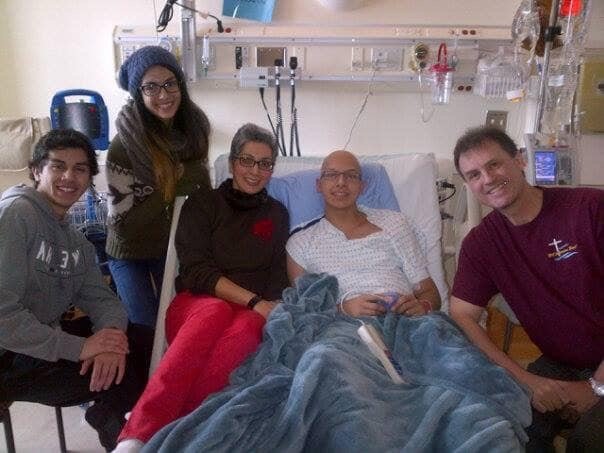The Strength of Many for the Strength of One!
Brendan Bell: Fighting a Rare and Sudden Cancer
Teenager Brendan Bell was experiencing shortness of breath and was sick to his stomach.
But his ailment wasn’t a respiratory infection or a stomach flu. It was a mass the size of a fist inside his chest. Within days, the mass was crushing his lungs, pushing his trachea against his spine, and impacting his heart. It was cancer – primary mediastinal large B cell lymphoma.
Brendan’s case was so rare that Alberta Children’s Hospital had never treated that type of cancer before. In fact, an oncologist would make a trip to Stanford University in the United States to get advice on the best treatment for a pediatric patient with the disease.
After six rounds of intense chemotherapy, the mass had shrunk to almost nothing. Brendan then had a choice: Should he do two more rounds of chemotherapy or call it a day? The 17-year-old who had entered Alberta Children’s Hospital was now considered a young man, able to make those decisions for himself.
“The first few times (chemotherapy rounds) weren’t that bad – the side-effect medications helped. It was when I got home, I often felt sicker,” says Brendan. “After the third time when my blood cell count would go down to zero, I would be really sick.”
Brendan decided to do the two additional rounds.
“I did them because I knew I had the support I needed to get through it.” That support included the registered nurses on the ward and his mother Shireen Bell – “the greatest mom in the world.”
A registered nurse herself, Shireen recalls that she was always treated as a “mom” first by staff at the hospital. As time went on, she would refer to the nurse assigned to Brendan as “my nurse too.” The nurse was always available to answer questions, provide updates, and advocate for Brendan and his family.
Shireen recalls the time Brendan gained 14 pounds in water weight over two days. Brendan’s nurse at the time – Tammera MacGregor – noted that Brendan’s body was puffy and tight, and he was very uncomfortable. While medical staff believed Brendan’s body would flush the fluid out over time, Tammera felt his body needed help to do that. She did the calculations related to Brendan’s fluid intake and outtake. She then advocated for him with the treatment team and they agreed.
Shireen says, “Tammera demonstrated a lot of technical precision and had the knowledge and confidence to advocate for him.” Within six hours of getting his diuretic Brendan was feeling much better.
For Brendan, it was the little things that made a big difference – toasting the New Year (with orange juice) with a group of nurses, participating in daily bingo games to break the boredom of confinement, and being given the option to eat a banana to increase his potassium intake rather than taking another pill or liquid medication.
“Overall the registered nurses did a lot of advocating for the kids on the ward – so all the kids would be best looked after,” says Brendan.
Six years later, Brendan is in full remission and a student at Red Deer College. The mass in his chest is long gone. But the memories of the care and support he received remain – captured in a collection of autographs from all those who supported him through treatment and recovery.
Tammera MacGregor: The Registered Nurse
RN Tammera MacGregor is certified to administer chemotherapy to pediatric patients. That entails checking and double-checking drug calculations, calibrating intravenous pumps and, as Tammera puts it, “making sure the right patient gets the right drug at the right time.”
Once the chemotherapy drugs are administered, Tammera continually monitors the patient’s vital signs, making sure he or she is not having an adverse reaction.
“Nausea is a common reaction to chemotherapy,” Tammera says. “But some drugs can cause a hypersensitivity reaction and put a patient’s life at risk. It is extremely important that we monitor things closely.” Emergency equipment and medications are always at the bedside.
What gives Tammera job satisfaction? “The biggest thing for me is seeing former patients grown up, doing well and contributing to society.” She notes that Brendan came by the hospital the other day, is finishing his degree and going to be a teacher. “We see kids and families at the hardest times of their life – it is very rewarding to see them doing things other than sitting in a hospital bed.”
ARNET: Support for Nurses
The Alberta Registered Nurses Educational Trust (ARNET) provide grants to Alberta nurses to advance their practice. ARNET has distributed over $9 million in educational supports to RNs and NPs to improve patient and family care. For more information, go to www.arnet.ca.

